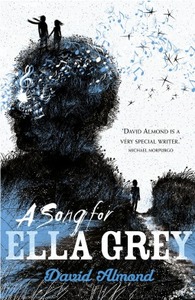Take a photo of a barcode or cover
3.5 stars
This book is simple yet complicated, weird yet classic, and sweet yet harsh. I think one has to know and understand the original story to appreciate this modern retelling. Otherwise, he or she will get lost.
This book is simple yet complicated, weird yet classic, and sweet yet harsh. I think one has to know and understand the original story to appreciate this modern retelling. Otherwise, he or she will get lost.
I love the wonderfully weird creations of David Almond and this modern retelling of the Orpheus and Eurydice myth did not disappoint. He is so clever in his writing, beautifully rhythmic words that entrance the reader just like Orpheus and his lyre.
Perfectly captures the mad joy, yearning, grief, and intensity of the last year of adolescence. Poetic and lovely, though the style wears on one over the course of an entire novel.
From Rebel Angel.
From the moment I read that this was a story based on the myth of Orpheus and Eurydice, I knew I was going to like this book (if you don't remember, Classicist over here!). It's a tale I know well, with my dissertation based around Persephone, Demeter and the Eleusinian Mysteries, so I'm well versed in everything Persephone. Then I realised it was set in the North East, and I was sold. The story follows Claire and her best friend Ella Grey in their final years of school in Newcastle. Their friendship group heads to the sands of Northumberland to camp for a few nights where they meet Orpheus, a strange boy who seems to wander the countryside with his music. They are all enthralled, but none so deeply as Ella, who, unable to be there, hears his voice over the phone, and falls in love. Yes, a cheesy love story of teenagers, but told so beautifully. We know from the start, not just from the well known tale of Orpheus and Eurydice, that something tragic will happen, so all the reader needs to do is wait until Ella is taken away from him, and he makes the treacherous journey to the Underworld to find her.
While this is sold as a book for children, I would definitely go more towards YA and would definitely recommend it to adults too. I've read criticisms of the writing, but I feel like it fitted perfectly with the dreamy quality the story had and was reminiscent of the writing style of my familiar Greek myths. Of course, I loved reading about familiar places of the North East, even names of places a couple of minutes walk from where I lived in Newcastle, and the group camping on the sands below Bamburgh Castle. The descriptions were fitting and beautiful; one especially that stuck with me was "the transfigured North" as they wish the North to become the Greece of their dreams. The book flits the line between real and mythical, which is a combination I'm never going to say no to. Basically, I really enjoyed this book - the writing, the story, the setting all came together perfectly to give me what I'm looking for in a book.
From the moment I read that this was a story based on the myth of Orpheus and Eurydice, I knew I was going to like this book (if you don't remember, Classicist over here!). It's a tale I know well, with my dissertation based around Persephone, Demeter and the Eleusinian Mysteries, so I'm well versed in everything Persephone. Then I realised it was set in the North East, and I was sold. The story follows Claire and her best friend Ella Grey in their final years of school in Newcastle. Their friendship group heads to the sands of Northumberland to camp for a few nights where they meet Orpheus, a strange boy who seems to wander the countryside with his music. They are all enthralled, but none so deeply as Ella, who, unable to be there, hears his voice over the phone, and falls in love. Yes, a cheesy love story of teenagers, but told so beautifully. We know from the start, not just from the well known tale of Orpheus and Eurydice, that something tragic will happen, so all the reader needs to do is wait until Ella is taken away from him, and he makes the treacherous journey to the Underworld to find her.
While this is sold as a book for children, I would definitely go more towards YA and would definitely recommend it to adults too. I've read criticisms of the writing, but I feel like it fitted perfectly with the dreamy quality the story had and was reminiscent of the writing style of my familiar Greek myths. Of course, I loved reading about familiar places of the North East, even names of places a couple of minutes walk from where I lived in Newcastle, and the group camping on the sands below Bamburgh Castle. The descriptions were fitting and beautiful; one especially that stuck with me was "the transfigured North" as they wish the North to become the Greece of their dreams. The book flits the line between real and mythical, which is a combination I'm never going to say no to. Basically, I really enjoyed this book - the writing, the story, the setting all came together perfectly to give me what I'm looking for in a book.
Poetic and dark.
I actually would love to see this as a play for teens. But, in general, not so much an Estelle book.
Keywords: Orpheus retelling, England setting, young love, best friends, tragedy, adopted main character
I actually would love to see this as a play for teens. But, in general, not so much an Estelle book.
Keywords: Orpheus retelling, England setting, young love, best friends, tragedy, adopted main character
Magnificent. This is an extraordinary piece of writing: haunting, beautiful, achingly sad but completely unsentimental. Watch out, because I'm going to be pushing this novel to everyone I know now. It's hard in a way, having read what I suspect will be the best book I read in 2016 in the first week of January.
I read it in one almost completely uninterrupted sublime gulp. You can read it quickly, because you get swept away by the power and rhythmic force of the language, but you will also want to go back and reread, re-experience some of those lyrical tour-de-forces of writing. The tone and timbre captures the voice of the English north without ever falling into caricature or making the reader trip. If I say it is "poetic," you will think "flowery," but it is not: it is achingly pure, precise, not a single word out of place.
The myth of Orpheus and Eurydice has been inspiring poets, artists and musicians for centuries, millennia. Somehow, Almond makes it new, infuses the power of the ancient myth into a contemporary world. Nor does he shrink from the violence of parts of the story, but somehow without ever mis-stepping, crossing the line into banality or excess. One thing I like is the ordinariness of the young characters. These are not disaffected or damaged youth. This is not a "problem" novel about teenage pregnancy or drug addiction. These are intelligent, self-consciously artsy, slightly bohemian young people on the cusp of adulthood, with all their restlessness and questioning and yearning, insecurity and brashness. What happens when you expose such young characters to love and beauty and art in their most ideal forms, reified in Orpheus? That it is a tragedy is not a spoiler if you know the story; what is unexpected is the joy that underlies the grief. But that is the power of the myth and of this novel.
It is a song. It is a masterpiece.
I read it in one almost completely uninterrupted sublime gulp. You can read it quickly, because you get swept away by the power and rhythmic force of the language, but you will also want to go back and reread, re-experience some of those lyrical tour-de-forces of writing. The tone and timbre captures the voice of the English north without ever falling into caricature or making the reader trip. If I say it is "poetic," you will think "flowery," but it is not: it is achingly pure, precise, not a single word out of place.
The myth of Orpheus and Eurydice has been inspiring poets, artists and musicians for centuries, millennia. Somehow, Almond makes it new, infuses the power of the ancient myth into a contemporary world. Nor does he shrink from the violence of parts of the story, but somehow without ever mis-stepping, crossing the line into banality or excess. One thing I like is the ordinariness of the young characters. These are not disaffected or damaged youth. This is not a "problem" novel about teenage pregnancy or drug addiction. These are intelligent, self-consciously artsy, slightly bohemian young people on the cusp of adulthood, with all their restlessness and questioning and yearning, insecurity and brashness. What happens when you expose such young characters to love and beauty and art in their most ideal forms, reified in Orpheus? That it is a tragedy is not a spoiler if you know the story; what is unexpected is the joy that underlies the grief. But that is the power of the myth and of this novel.
It is a song. It is a masterpiece.





